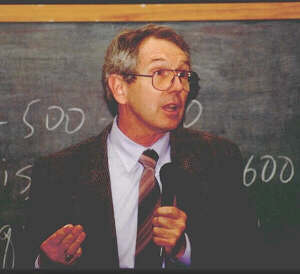
begin audio session; lecture 1, part 1:
The Periods of Western Music



"One of the things that I would like to do, is to talk about music from the point of view of what you hear," said Dr. Michael Broyles, summarizing his listener oriented approach to understanding music.
"We're going to focus on music in the Classic and Romantic period," Dr. Broyles continued, "but fortunately that's most of what you hear in concert halls." He began by placing his subject in temporal context, beginning with the misty origins of Western music in antiquity in Egypt , and elsewhere, and quickly moving into the medieval period from 500 AD to 1400 AD , best known today as the time period of the Gregorian Chant .

"Next we have the Renaissance ...which goes from 1400 to approximately 1600," then the Baroque period , from about 1600 to about the middle of the 18th century . Baroque is characterized by the invention of opera and towards the end of the period by the composers, Bach, Handel and Vivaldi.
The Classic Era began in the mid 17th century, and continued into the early 19th century; the precise dates are in dispute. The compositions of Haydn, Mozart and the early works of Beethoven typify this period. The Romantic period began as the Classic period ebbed and continued until about the beginning of the 20th Century. Schubert , Schuman, Wagner , Brahms, Liszt are some the many well known composers associated with the Romantic period.
Dr. Broyles calls the music after the Romantic period, "Twentieth Century", and "there's a lot of exciting stuff happening in the last decade or so, so don't run away from Twentieth Century music."

